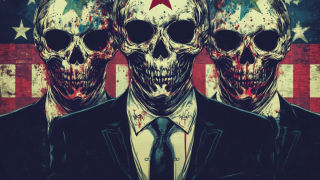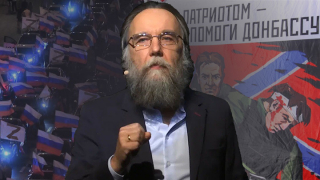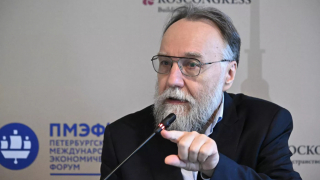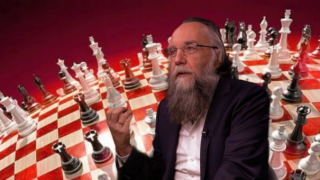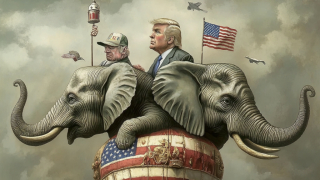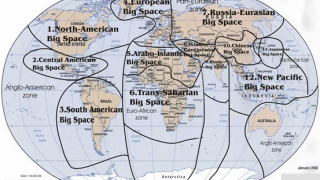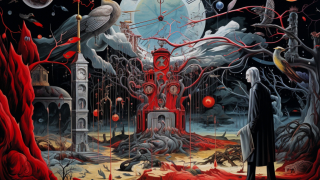More than just politics: eurasianism
“The refusal of Eurasianism to be a strict follower of Western model satisfied traditionalists (Erbakan and his successor Erdogan); the interpretation of Eurasianism in the sense that “approaching towards West without giving up on national and cultural identity” attracted military circles and Kemalists to itself. Eurasianism, thus, has become an ideal worldview able to coalesce Islamic and secular poles in Turkish society.”
Alexander Dugin, 2006
We have been through an era in which the pillars of the world are shaken, the conflicts are deepened and the question “quo vadis” is continously being asked.
The decision of Anglo-saxon civilization which has ruled the world in every terms since Industrial Revolution to overcome its dead-end through expanding its crises all over the world caused the carpet of civilization on which we live to catch fire.
The process that breaks the rituals and symbols and forces people to change their customs, while creating a necessity to make a new sense out of their lives, urged political forces to redefine the front which they stand by.
Is it possible to get out of the lines drawn before, to approach the present, past and future from a different window and to create a novel civilization?
If we speak of science, it is creating a new method needed to open a new window.
Alexander Dugin offers to surpass the material and spiritual nausea being experienced universally by a method called Eurasianism whose “scientific key” is geopolitical laws.
Dugin’s name has became familiar for Turkish people as the consultant of Russian President Vladimir Putin when he held critical meetings in Turkey and made important statements right after the 15 July coup attempt broke out.
His recent work published in Turkish by Kaynak Publishing House with the title of “The Frontage of Humanity: Eurasia”, which is a collection of presentations and assesments, is an important study in order to understand Russian diplomacy and this outstanding figure of intellecutal political life.
Dugin brings a new perspective to the problem of locating first Ottoman Empire then Turkish Republic in world politics since Tanzimat reforms in 1839, and to the roots of political tides of AKP government between U.S. and Russia in recent times. At the same time, he proposes a new future envisagement under the title of Eurasianism against the monopolar world.
Then, what is this Eurasianism and what is the place of Turkey in that project?
The Eurasianism is a political doctrine, born in the early 1920’s, reformed by a cadre under the leadership of Dugin during the fall of Soviet Union in 1991, including theories about the multipolar globalization scenario.
Dugin defines Eurasianism above else as “an intellectual movement, a political philosophy, a spiritual stream”.
We see that Eurasianism is much more than only reelpolitik moves, a theory containing concrete projects but rather a civilization project including controversial ideas and offering a new human ideal. The points of that project where it diverges from and converges on the interests of Ankara deserves an elaborate attention.
I) Eurasianism as a Geopolitical Outlook
Geopolitics constitutes the scientific key of Eurasianist perspective. Geopolitics is a branch of science that stands for the idea that ideology is not the important factor on the development of economic, social and cultural events but the geographic location of country at issue and rather the conditions and necessities brought about by that specific location is determinant.
This geopolitical laws as the foundation of Eurasianism, even if Dugin does not make a explicit reference to it, bears a resemblance to the Theory of Climate (Theorie de Climat) of French philosopher Montesquieu (1689-1755) propounding the idea that geography and climate is determinant on the customs and rituals of societies.
Hereby, it is important to note that Montesquieu’s ideas centering on geography – putting aside the chapters turning into orientalism – suprisingly coincides with the ideas of famous Islam philosopher Ibn Khaldun (1332-1406).
Eurasianism doctrine, while refusing “the world structure based on the centre-periphery model”, envisages the division of the world across four horizontal belts or meridian areas from north to south” in place of that model.
Dugin puts forward in the internal mechanisms of these meridian areas not the project of “national states” but the project of “state blocs organized as a continental federation resembling democratic empires.”
In this framework, American Continent is taken into consideration as a single pole whose center is U.S. So it remains ambiguous where the leaders acting in concert with Asian and African anti-imperalists like Fidel Castro or Chavez find their places in this picture.
As the second pole, it is agreed one area composed of European Union at the center, Europa, North Africa, Sub-Saharan Africa. The zone of Mediterrenian Sea between Europe and Africa is named “European Lake”. It is meaningful to ask at this point whether nations like Algeria and Tunusia which put a long independence struggle against French imperialism would accept to swim in “European Lake” or not.
The third pole is the most controversial part. There arise a Eurasia picture whose center is Moscow; with Iran facilitated to integrate into Eurasia through Pakistan and Afghanistan on the one side; with Turkey conducting harmonous cooperatin with Russia on the axis of Caucausians, Azeraijan and Turkic Republics on the other side; along with the geography in south leaning towards India.
The fourth and the last pole is the Pacific area with China and Japan at the center and covering Indonesia, Malaysia and other regional countries. It can be said that Dugin overlooks the Chinese moves towards universal centralization.
It can be seen from the Eurasia picture Dugin draws that even if he opposes the centre/periphery dichotomy, Russia places at the center, and Turkey and Iran at the periphery.
It is also questionable why the interaction spheres of Turkey exceeding from Belgrad to Islamabad and Algeria is ommited and why there has to be a pattern which narrows down this sphere.
Besides that, how it is assesed in Dugin’s project the structures like “Non-Aligned Movement” whose foundations are laid in Bandung Conference in 1955 and reflecting the endeavours of the oppresing world nations like China, Yugoslavia, Egypt and India to create a pole not to choose side between U.S.-Russia strife?
It is clear that to form regional unions is a necessity to emancipate from the yoke of U.S. imperalism. However, the developments in Syria and the relations between U.S.-Russia-China shows us that the situation of unions based on short-term interests can change immediately.
II) Globalisation and Eurasianism
Dugin describes Eurasianism as “the project covering the tendencies and streams against monopolar globalisation and giving a doctrine character to them”.
The force that Dugin calls “monopolar globalisation” is U.S. imperialism. Dugin proposes that a Washing-based globalisation is nothing but the universalization of “artificial modern enlightenment projects” which constituted United States of America and underlines that it is only by a “multipolar globalisation” we can stand against this.
He defines a great variety of political formations from a Germany-France based European Union to Lebanese Hezbollah as parts of Eurasia even if they have diverse reasons to contradict with U.S. imperialism. “New right” formations rising across Europe like Le Pen’s Front National are supported for their anti-globalisation stance.
It is obvious that we should collaborate against the pillage of Baghdad Museum by American soldiers under U.S. invasion, the spead of McDonaldization even into the steppes of Middle Asia, in short, against the “de-identifications of nations”.
Dugin holds that we can fight with U.S. only through a multipolar globalisation, that is, through founding “democratic continental empires”. He sees, in turn, nation states as “the product of the imperialist enforcement of Western model to all humankind”.
It is worth to note that Dugin makes a distinction between nation states having a deep state tradition and artificial states created to divide the region and he believes in the short run it is necessary to protect traditional national states against Atlanticist siege.
Nevertheless, in the middle run he envisages a project that national states unites into continental confederations.
From the perspective of Turkey, it is without a doubt that U.S. attacks with its ethnic (PKK) and secterian (FETO) proxies to our Republic founded on nation state formation and it imposes a American-type culture in media, culture and art.
Unfortunately, these attacks against the nation phenomena causing society to become corrupt, rootless and divided is applauded by liberals in the name of globalisation and by Islamist in the name of panislamism. We can resist these internal offences orchestrated by global centers only through forming international alliances which support the protection of our Republic and nation states.
It is clear that these international alliances we rely on have to take a explicit stance alongside with Ankara about the 30-years-long problem of ethnic terrorism.
Regional powers accepting themselves as Eurasion should understand that for the peaceful and constructive way of discussing the future of regional people around the table of civilization, the elimination of Atlantic-backed ethnic and secterian terrorist organizations is most crucial.
In this context, respect for internal affairs and common struggle against terrorist organizations whatsoever will be the concrete steps towards of the determination for common future.
III) Eurasianism as a Civilization Project
Eurasianism, besides its being a realpolitik doctrine and an anti-multipolar globalisation movement, contains a civilization project in itself.
On the local plane, it includes the recognition of the peculiar civilizations pertaining to the nations of Eurasian geography. On the universal plane, it offers a civilization project which embraces and defends religion, customs, imperial culture for resisting Atlanticist standardization.
Dugin develops a geographically original perspective and underlines that Eurasianism should be built on “not uniting West and East or synthesizing them but preserving diversities”. He puts the backbone of Eurasian geography on historically intertwined Turko/Slav togetherness and religiously Orthodox/Shi’ite resemblence.
Dugin’s perspective embraces a cultural unity depending on the geography which common historical and cultural elements created.
Sociollogically, it is understood from the different writings of him that Dugin defines secularism as a product of modern Western enlightenment and a “Western value”.
In this context, there arises the question of where he puts in his Eurasian civilization project Mustafa Kemal Ataturk who fought against Western imperialism in order to create an independent and secular Turkish Rupublic and secular Baas movements of Middle East resisting against imperialism.
For instane, should we name Baas Party of Syria which is the resistance center of the present against Atlanticism as Western for it stands for secular values?
We see worth in asking these questions if we take Eurasianism into consideration as a civilization project beyond a geographical view.
It is unquestionable that we must search for ways of contacts and cooperation if necessary with the forces who stand against Atlantic hegemony. The progressives and independentists righfully seek to find forces both at home and abroad to collaborate with against imperialism.
We see benefit in taking one step forward this search and in the days when the chains of imperialism started to break we continue to ask questions concerning our future:
Are the forces we are in contact with against imperialism both at home and abroad still going to be our allies when we send U.S. imperialism out of our lands?
What common grounds we share with these forces except anti-imperialism?
On which historical, social and cultural rivers we unite with Russia, Iran, Iraq, Syria, Azerbaijan and other regional countries putting aside geographical and economic cooperation?
How will the administrative structure of a regional unity be shaped?
The requirement of thinking on where the boundaries of the civilization we are going to create start stands as an undeniable fact in the times when the boundaries drawn by Anglo-saxon civilization are becoming ruins.
These questions and the aswers to them can be furthered. We have yet summed this important subject about the future of our country and humanity and tried to put forward the points which we consider as the most important.
We hope that the questions inspired by Dugin’s book serve as a sparkle to discuss the foundations of the civilization we intend to create among different circles.
To a future we live as “brothers/sisters like a forest”...



